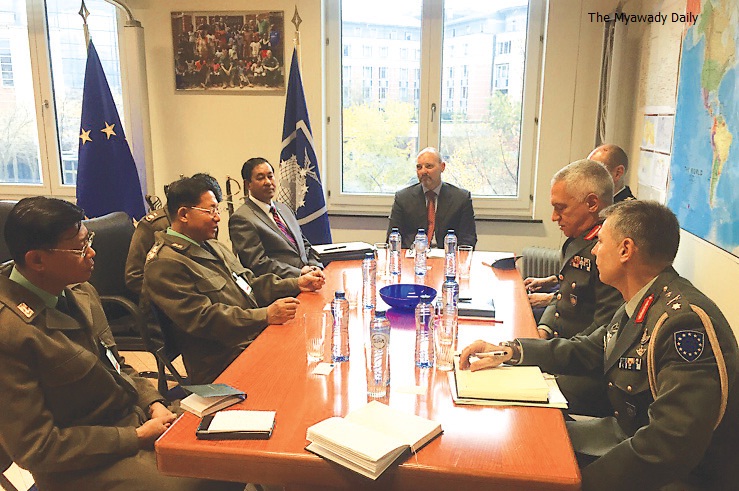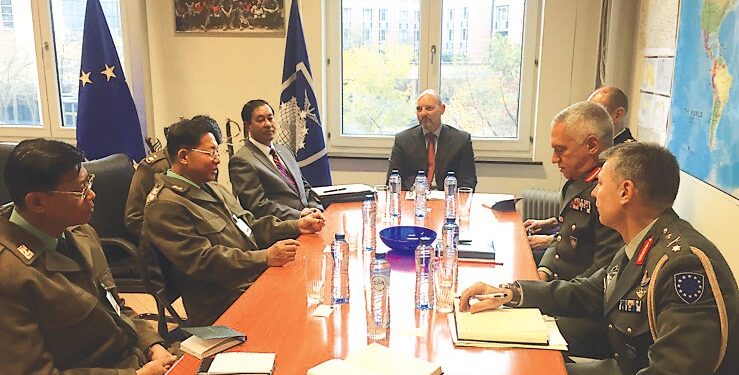On November 7 2016, Senior General Min Aung Hlaing, the commander-in-chief of Myanmar’s military, proudly delivered a presentation on the military’s efforts for democracy to the European Union Military Committee (EUMC) meeting in Brussels. To the surprise of many, he had been invited as the guest speaker for that meeting of the EU military chiefs by the then-EUMC Chair General Mikhal Kostarakos.
In its press statement, the EU mentioned that the participation of Snr. Gen. Min Aung Hlaing in the meeting was an achievement of “military diplomacy helping Myanmar to regain its position in the world’s political scene”. On that trip, Myanmar military’s chief also met with the EU officials to discuss “further military ties” before visiting Italy for engagements with military officials and defense companies.

This was followed by another trip to Austria and Germany on April 22 2017. While there, Snr. Gen. Min Aung Hlaing met with his German and Austrian counterparts and made several visits to local defense companies and industries. Around that period, not only the EU, but the United States also planned to gradually re-engage its military to military relations with the Myanmar military, initially by extending some training programs with the junior officer corps.
Narrative of Constructive Engagement
Wishful thinking was then prevalent in the West that advancing constructive engagement with the Myanmar military could enhance the professionalism and democratic outlook of its officer corps and speed up their withdrawal from politics. That sort of thinking primarily flowed from the narrative that after political liberalization in 2011, the military was ready to gradually retreat from politics if its leadership could be assured that the new constitutional order led by the civilian authorities could function without threatening territorial integrity, security and stability.
In reality, the military carefully planned to ensure its power under a disciplined democracy and lacked a genuine desire to disengage from politics. Under the 2008 constitution, they predetermined the extent of space for civilians to operate within, to what extent they would scale down political intervention and when they would intervene to shut down the nascent political space. As an armed forces which deeply perceived themselves as entitled to rule the country in perpetuity, the military has never intended to fully disengage from politics.
The narrative of the military’s voluntary withdrawal from politics fell apart completely when it seized power on February 1 2021. Some might argue that the military did not have a plan for its coup and that tension between elected civilian leaders and the military in the previous five years led to the takeover. During the first five years of National League for Democracy (NLD) rule, the civilian government held to a conciliatory stance towards the military, and there were no incidences that risked threatening the territorial integrity of the country or the institutional autonomy of the military.
With hindsight, however, it becomes clear that civil-military tensions only reached a crucial boiling point with the November 2020 election, the result of which compelled the military leaders to launch the coup. It was a choice wrought not by civil-military contestation but by the military’s fear that the NLD, if they remained in power for two full terms, would become firmly entrenched in a political leadership role that would enable them to finish off the military’s remaining political prerogatives and economic privileges.
Constructive engagement with the military by Western democratic countries did not transform the military into a professional organization, but instead inadvertently emboldened and legitimized its leadership to do whatever they wished. Less than a year after Snr. Gen, Min Aung Hlaing’s trips to the EU, the world was stunned to witness the military committing the brutal crimes in Rakhine State that a UN fact-finding mission labeled a “genocide” against the Rohingya minority.
In fact, this was nothing new in the modern history of Myanmar. There is a long history of military atrocities, ranging from campaigns of terror that may amount to crimes against humanity in the ethnic minority areas to brutal suppression and mass slaughter of civilian protestors in urban environments. Constructive engagement without holding the military to account for its past crimes, and without promoting the roles of its civilian counterparts, had the unintended consequences of virtually strengthening the military’s political positions and legitimizing its barbarous atrocities.
Narrative of the pro-democratic and stabilizing force
Similarly, there is another narrative that the next generation of Myanmar military officers would be more liberal and pro-democratic. This narrative was widely popular even before the “8888” uprising of 1988. In this narrative, Western investment in the future generations of Myanmar’s officer corps via academic opportunities and exposure to the West could depoliticize and professionalize the force. However, no evidence has emerged that the new generation of officers have changed their approaches and ideological orientations. On the contrary, they became woefully more antagonistic towards Myanmar’s pro-democratic forces.
Daw Aung San Suu Kyi seems aware of this fact, despite her persistent conciliatory overtures towards the military as “her father’s army”. When the veteran journalist Bertil Lintner asked her in February 1989 if there were any younger officers who were more sympathetic to her, she replied, “No. It’s the opposite. Some of the older officers are okay as they are still loyal to my father [General Aung San, the founder of the Myanmar military]. The younger officers are the worst. They rose to prominence under Ne Win [the first military dictator who established the precedent for coups in Myanmar] and were hardened in combat in ethnic minority areas.” Now, the new officers who ascended to the top positions under Than Shwe [the dictator who created the post-2010 political reform] deposed and arrested her and also followed their predecessors in murdering the people they vowed to protect.
Another prevailing narrative is that the military is a “stabilizing force for the country”. The military has justified its political interventions with this narrative since 1958 and, through its propaganda machines, some analysts and even some neighboring countries has bought into that narrative. They believed, as the generals always claimed, that unless the military played its active political leading role, the country and its sovereignty would be at risk of disintegration. Even after the coup, Snr. Gen. Min Aung Hlaing said that “the military is the only force holding Myanmar together and always striving to prevent the country’s disintegration.”
Historically, as Andrew Nachemson once wrote, the military is “a force of chaos, not stability”. In 1962, the military staged a coup with the dubious justification that the country was at risk of drifting towards disintegration due to the federal ambitions of the ethnic minority groups under civilian rule. The military has persistently hung onto that justification ever since, despite the 1962 coup leader Ne Win regrettably admitting that “he would not have carried out the coup if he was well-informed of the Buddha’s Dhamma (teaching) at that time”.
Notable Shan scholar Chao Tzang Yawnghwe also argued that instead of keeping the country together, “the 1962 coup brought about havoc and ruin to the country, damaging the political links between the various ethnic components of Myanmar”. Also, in the recent coup, the military has obviously destabilized the previously stable political order by bringing an end to the country’s brief experiment with political development and dragging the country into chaos and towards the status of a failed state.
Narrative of Restoration of Democracy
The final key narrative is that military rule is transitory and temporary with the generals being ready to voluntarily transfer power back to elected civilians as they have promised. That narrative was also widely circulated in 1962 and 1990 after the military staged coups. Following the 1962 coup, General Ne Win said in the fourth meeting of the revolutionary council held on March 16 1962 that “the military would not rule the country for a long time”. Ne Win’s military council promised to pave the way back to constitutional rule led by a civilian political leadership. However, the military leaders of the council simply exchanged their uniforms for mufti, crafted the constitution as they wished and ruled the country for 26 years in different incarnations.
After the 1988 coup, the then military chief General Saw Maung promised that the military would return to their barracks and transfer power back to elected civilians after the 1990 election. In reality, the military would rule for another two decades. In 2021, coup leader Snr. Gen. Min Aung Hlaing said again that military rule will be temporary, and that it will hold elections and transfer power back to civilians. That narrative has been catching the attention of the international community, mostly countries from the region.
Nevertheless, the coup leaders, as the UN special envoy Christine Burgener has said, “appear determined to solidify their grip on power” by annulling the 2020 election won overwhelmingly by the NLD, extending their stay in power from a one-year emergency to August 2023, and declaring Snr. Gen. Min Aung Hlaing as the prime minister of the newly-formed caretaker government. Just six months after the coup, it has become obvious that the narrative of temporary military rule is fundamentally flawed.
All these narratives relating to the military have been more or less integral in the approaches of the international community towards Myanmar. The policy makers of the international community have not yet relinquished the hope that the junta will voluntarily restore civilian rule. Also, they believe, as Biahari Kausikan is convinced, that the military is the only indispensable stabilizing institution that can keep the country together. Consequently, constructive engagement with the military without imposing too much pressure on it, as the Association of Southeast Asian Nations (ASEAN) is now cheerleading for, is the only way to enlighten the officer corps and to guarantee a return to some form of civilian rule.
The military’s political prerogatives have been deeply entrenched in Myanmar politics for a long time. As an army ingrained with a distrust of civilian politicians and entrenched with the notion of playing the leading political role in the country, any hope that the junta will voluntarily transfer power back to a civilian government through elections is nothing more than a daydream.
Recent evidence has demonstrated that the officers of the Myanmar military have been extremely hostile towards pro-democratic forces and that they haven’t hesitated to destabilize, even to destroy, the country in order to rule it. Similarly, another round of the constructive engagement promoted by ASEAN is definitely destined to fail. Rather than resort to the old narratives attached to the military, the time has come for the international community to demystify the old narratives and to reconsider its approaches in formulation of policy concerning Myanmar.
Ye Myo Hein, aka Ko Ye, is the public policy fellow at the Wilson Center’s Asia Program and the executive director of the Tagaung Institute of Political Studies.
You may also like these stories:
Myanmar’s Military Chief Staged a Coup. But He Did Not Act Alone
Rohingya Without Myanmar ID Not Being Given COVID-19 Jab: Junta
Myanmar Junta Troops Killed in Sagaing and Kayah

















